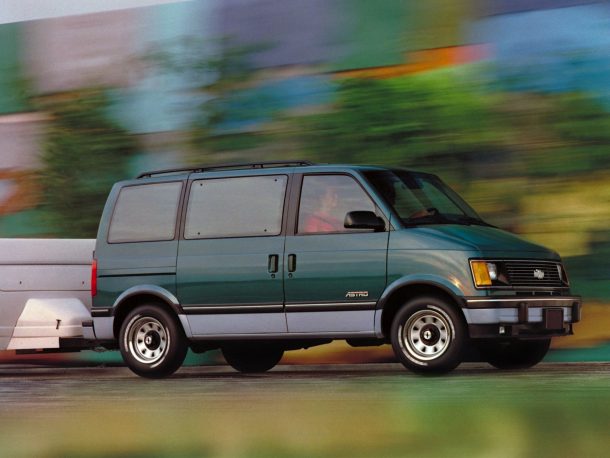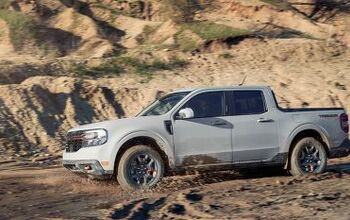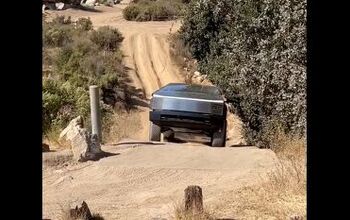Chevrolet Astro Revival? How About… No

This must be some sort of irony-steeped Radwood thing. How else to explain the sudden resurgence in enthusiasm for a mid-sized van that loitered in General Motors’ lineup for two uneventful decades?
It seems there’s a concerted — though perhaps not entirely honest — effort to return the lowly Astro to the Chevrolet stable. It’s a plaintive wail that will absolutely fall on deaf ears in the boardrooms of the Renaissance Center. And so it should.
Matthew Guy brought this campaign to my attention, resulting in a round of vitriol for GM’s rear-drive Astro and its GMC Safari twin. There’s a website devoted to the effort, as well as a totally bitchin’ video that sounds, at least, like it may have aired after an ad for New Coke.
Clearly, some van types remain enamoured with the bowtie box.
Chevy Astro production ran for 20 years, 1985 to 2005, with a second-generation model appearing exactly at the midpoint of its lifespan. After the initial base Iron Duke 2.5-liter (offered in cargo variants) left the engine roster in 1990, GM upped the versatility factor via optional all-wheel drive. The lone engine from then on was a 4.3-liter V6 sourced from the General’s truck stable.
Positioned as a larger, more voluminous alternative to Chrysler’s hot-selling minivans, the Astro and Safari are more often associated with the sad, rumbling, rusted-out hulks they became later in life. There were some neato bits, however, like a futuristic-but-annoying gauge cluster ( panned by John Davis) that eventually gave way to a conventional analog set. There’s one on eBay right now. Just imagine that speedometer climbing that hill on a chariot of light.
The most damning indictment of the Astro/Safari came from the Insurance Institute for Highway Safety, which revealed the Astro’s dismal crash performance in graphic detail. That bolt-on subframe didn’t seem to lend much rigidity to the van, which folded like wet newspaper in a head-on hit. The buckling never ends!
If that driver has any leg left after that bone-snapping impact, at least the door is open for easy egress (or paramedic entry).
Given the General’s timely departure from the still-shrinking minivan segment and the continued production of a full-size commercial van line that’s barely changed since 1995, it’s unlikely GM will bend to these weirdos’ whims and create a successor to the Astro. There’s too much money to be made from the automaker’s dizzying array of crossovers and SUVs.
Spacious and versatile as it was, the Astro belongs to history now, and that’s where it should stay. There’s already a viable modern alternative for van types: the excellent Ford Transit and Transit Connect, both available as a cargo or passenger wagon.
[Image: General Motors]

More by Steph Willems
Latest Car Reviews
Read moreLatest Product Reviews
Read moreRecent Comments
- 28-Cars-Later WSJ blurb in Think or Swim:Workers at Volkswagen's Tennessee factory voted to join the United Auto Workers, marking a historic win for the 89- year-old union that is seeking to expand where it has struggled before, with foreign-owned factories in the South.The vote is a breakthrough for the UAW, whose membership has shrunk by about three-quarters since the 1970s, to less than 400,000 workers last year.UAW leaders have hitched their growth ambitions to organizing nonunion auto factories, many of which are in southern states where the Detroit-based labor group has failed several times and antiunion sentiment abounds."People are ready for change," said Kelcey Smith, 48, who has worked in the VW plant's paint shop for about a year, after leaving his job at an Amazon.com warehouse in town. "We look forward to making history and bringing change throughout the entire South." ...Start the clock on a Chattanooga shutdown.
- 1995 SC Didn't Chrysler actually offer something with a rearward facing seat and a desk with a typewriter back in the 60s?
- The Oracle Happy Trails Tadge
- Kwik_Shift_Pro4X Union fees and corruption. What can go wrong?
- Lou_BC How about one of those 2 foot wide horizontal speedometers out of the late 60's Ford Galaxie?


































Comments
Join the conversation
Back in 1989 I was 9 years old and my Dad wanted to buy a new Suburban for the family. He couldn't swing the payments so the dealer talked him into an Astro, the "man van". Suited our family of 6 perfectly. By the time I was driving in the mid 90's the van was often mine. In 1999 my brother hydroplaned off the interstate and totaled the van, although he walked away just fine. Now it is 2020 and I drive a Ford Transit Connect for my family of 5. The modern "man van", or closest thing to it. Apple doesn't fall far from the tree.
How about... ... the ASTRO was the best van for adventure any company has ever made.